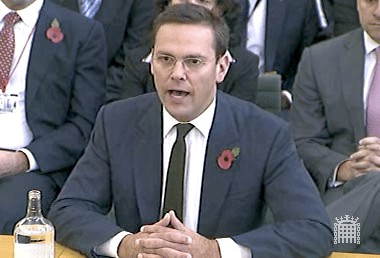
James Murdoch’s very ability as an executive was effectively put on trial Thursday, as UK MPs investigating the phone “hacking” scandal queued up to undermine his corporate competence.
While they dealt sometimes untidy, sneery spears in his direction during his second testimony to the culture, media and sport committee, Murdoch sought to reply calmly, specifically and politely, promising follow-up answers to what he could not answer.
But the MPs’ remarks were savage indeed. They opened a frontline talking point – the extent to which C-level businesspeople should devolve managerial oversight or should have detailed awareness of their business.
Murdoch, who said his executives had not given him full information about phone “hacking” early enough, said that he “(relied) on executives responsible to go and do the things they needed to do on the assumption they would be questioned from time to time”.
“Are you familiar with the term ‘Mafia?’,” prominent questioner Watson asked, going on to seek Murdoch’s familiarity with the Mafia’s “omertà ” code of silence. It barely prompted a deviation from Murdoch’s line of businesslike responses, to call Watson’s questioning “offensive“.
“Mr Murdoch, you must be the first mafia boss in history that didn’t know he was running a criminal enterprise,” Watson replied. But Watson’s impassioned rhetoric risked spoiling what was otherwise his ongoing line of specific and forensic explorative questioning.
MPs were incredulous that Murdoch, who is News Corp.’s international CEO and chairman plus its deputy COO – was unaware of specific sums News International’s legal manager Tom Crone was using to settle cases with early phone hacking victims. He said Crone was authorised to make payments only within a certain ballpark and had made payouts above his authorisation level…
“It may not be the Mafia, but it’s not Management Today. It doesn’t sound like a textbook example of how you would settle a case.”
Murdoch replied: “This was something that was within the remit and responsibility of the editor and the legal manager … it was left to them to manage the issue.”
“I can’t believe you’ve been so successful by being so cavalier with money. Your defence is, the News Of The World is a tiny part of the business.” Davies supposed Walmart’s COO would not regard its Asda business with little oversight despite being a relatively small part of the whole group.
“I find it absolutely incredible you didn’t say ‘How much? Let me have a look at that!’ I can’t believe that is a course of action that any self-respecting chief executive or chief operating officer wouldn’t take when the corporation’s reputation is at stake.
“This is really pretty lax for somebody in your position. Do you, as a result of this, have a more hands-on approach?”
“I’ve got this growly Australian accent rattling around in my head (Rupert) who would say ‘How much more is this Glenn Mulcaire going to cost me?!’
“It’s remarkably incurious (of you). Are you always so incurious with the other businesses you run in News Corp?
“It didn’t seem relevant for you to ask for a copy (of the QC’s legal opinion)?” Murdoch replied: “It didn’t seem necessary for me to ask for a copy of it.”
Farrelly continued: “So, even at that time in 2009 you are possibly the only person in London who still thinks there’s one ‘rogue reporter’ and one private detective?” Murdoch replied: “The company relied for too long on assertions about the thoroughness and completeness of those investigations as well as those of the police.”
“Do you think you have handled this competently?”
Murdoch responded: “I have spent quite a bit of time reflecting on my own decisions and the company’s behaviour more generally. For the time I had direct responsibility in 2008 and up to middle of 2009, with respect to the settlement, I behaved reasonably given the information I had.”
Farrelly continued; “Do you think this whole saga and your evident lack of curiosity in not asking questions that were screaming to be asked make you incompetent?” Murdoch replied: “No, I don’t think it makes me incompetent.”
“There must obviously have been some flaws in the corporate governance. You showed a lack of willingness to deal with the lack of corporate governance.”
Murdoch’s defence is based mostly on his assertions that the company relied for too long on the Metropolitan Police’s own belief at the time, now incorrect, that the hacking issue was confined to one reporter, and that two of his executives had not given him information to the contrary.
He said he has sought to implement changes that “improve on-the-ground corporate governance“…
“We’re making the changes which will hopefully ensure greater transparency if things do go wrong but will also ensure the prioritisation of matters of transparency up and down the business,” he told MPs.
“What I’m trying to learn from the events … try to understand why the company couldn’t come to grips with some of the issues in front of it in a way as fast as I woud have liked.
“I’ve reflected on where there were alarm bells that should have been heard more loudly.
“One of the changes we’ve made is significantly tightening up (legal) cash payments to the extent that, for a period of time, they were banned,” Murdoch added.
Murdoch acknowledged that News International should have more fully investigated original hacking claims rather than go in to defensive lock-down…
“The company did push back too hard. The company moved in to an aggressive defence too quickly.
“There was a tendency to react to criticism or allegations as hostile or motivated commercially or politically. But at no part did we suffer from ‘wilful blindness’.
“A more forensic look at the specific evidence given to this committee in 2009 would have been something we could have done. I could have directed the management of the company to do differently.
“But, at that time, I had stepped away from day-to-day management of News International.”